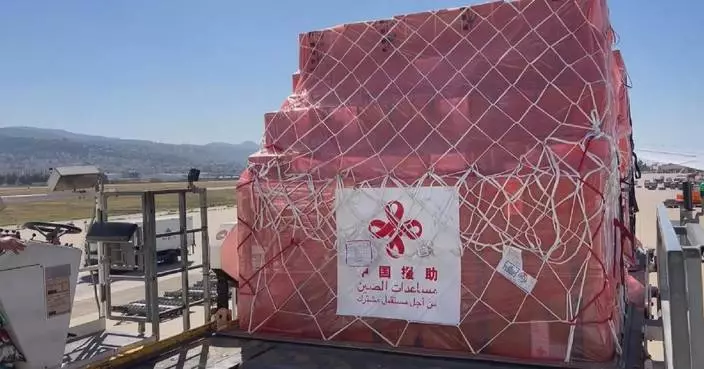The ongoing conflict between Israel and Hezbollah is crippling Lebanon's economy, as businesses and local companies struggle to navigate the escalating crisis.
Lebanon's economy has been in a downward spiral as the war has affected major sectors like trade, industry, and tourism.
"Tourism and services, this was affected a lot during the last period because of the wars, and we had big problems in this sector. Many companies had to shut down, like hotels, like restaurants, like clubs and even rent-a-car companies. These contribute a lot to the GDP of Lebanon. Lebanon today has a GDP of 25 billion [U.S.] dollars which is down from 55 billion [U.S.] dollars in 2019," said Bassem Bawab, president of the Consortium of Lebanese Enterprises.
The Israeli offensive has expanded from southern Lebanon to other cities, including Beirut, the country's capital and business hub.
Many business owners had fled the country with their families, fearing for their lives, but many opted to stay and adapt to Lebanon's rapidly changing situation.
Hani Bohsali, an importer, said his offices and warehouses near the airport were recently damaged in an Israeli raid targeting a Hezbollah-controlled neighborhood nearby.
"We have been moving from huge offices to a very, very small place just to accommodate all the people that are there and this is one of the problems. There are companies that have been smashed out because they are all located in unsafe regions and they have totally closed," said Hani Bohsali, chairman of the Food Importers Syndicate.
Bohsali said he remains committed to keeping his business running despite the security risks.
Managing employees during such critical times has been another challenge for employers like Asaad Sacall, whose holding group is operating at around 50 percent capacity.
"(It is) impossible to work in full capacity because we cannot force any employee to come to work at the time there is bombing in lots of areas. Streets are not secure. Those employees don't know when they are at work if they can go back home. Some are not coming, working online from home, and some have left the country," said Asaad Sacall, president of the Lebanese Kuwaiti Business Council.
Sacall said he has been forced to seek alternative measures to prevent further losses.
"We are planning immediately a new factory, mainly in the Arab area, to be opened up in a couple of months, to be ( to have) always a plan B for our factory in Lebanon. We're building some new network of customers from there," he said.
Moving operations out of the country harms not only Lebanon's economy but also its workforce.
"We know that more than 200,000 Lebanese laborers out of one million are not going to work by force (they are being forced to stop working). And we have a very big percentage (of workers) now that will be laid off if the war continues," Bawab said.
They all agreed that a ceasefire was urgently needed to restore stability to their beleaguered nation.

Lebanon's economy reels amid Israel's war with Hezbollah
Bird protection stations near provincial borders in China have been strengthening patrolling and adopting technologies to ensure safe travel for migratory birds as the country poses to establish an extensive work mechanism covering major bird migratory routes across five provinces.
The cross-provincial work mechanism, involving Hunan, Hubei, Jiangxi, Guangdong, and Guangxi, will help strengthen cooperation in fields like information sharing, joint law enforcement, technological cooperation and environmental conservation.
It marks the first attempt of China to increase protection for migratory birds by coordinating efforts from multiple provinces.
The work mechanism will also see stations be set near provincial border to monitor and protect migratory birds, with protective work like patrolling to be launched jointly.
Responsible for monitoring birds traveling along a 40-kilometer route, Nanfeng'ao Migratory Bird Protection Station in central China's Guidong County, Hunan Province, has been strengthening efforts to ensure safe travel for migratory birds entering the province from Jiangxi.
Xiong Fuliang, now in his 60s, has been working as a warden at the protection station since 2014. Patrolling the mountains in search for wounded migratory birds is a part of his job, he said, adding that the migratory season always keeps him busy.
"The wind is strong at night and if it rains, the birds get wet and they tend to clash with the trees and get wounded. If the weather is bad, we will immediately start our patrol to check if there are any wounded birds. If we find them, we will call the forest wardens at once," said Xiong.
As a veteran patroller, Xiong is capable of imitating various bird chirps, a skill that helps him locate wounded birds by stimulating their responses.
He is also able to identify the wounded or trapped birds simply by their chirps. With the techniques, Xiong has saved 13 birds over the recent years.
"The wounded migratory birds have little strength and their chirps sound different. The sounds made by the healthy ones are typically louder. The wounded ones make sounds like 'gu gu gu' and the healthy ones make sounds like 'gua gua gua'," said Xiong.
As mountainous as Nanfeng'ao is, human patrolling is hard to reach every corner of the region and since early this year local wardens have been using drones to improve their work.
"Because the drones are equipped with the night vision devices and the infrared thermal imagers, we use them to detect at night the places frequently visited by the bird hunters, especially the abandoned ones. We also use them to detect the places that are hard to reach. If any suspicious traces are detected, we will send personnel there," said Huang Yongfeng, a forest resource warden of Guidong Forestry Bureau.
Mountainous regions are preferred by migratory birds as airflows going up from the valley bottom help them fly with less efforts. Home to 22 mountains over 1800 meters above the sea level, and with three of them forming a perfect migratory route, Guidong is the staging post for almost all the migratory birds traveling from Inner Mongolia to south China.
"At this time of the year, we see numerous migratory birds flocking to Guidong. The rolling hills and continuous passes on their travel route form 'an aerial channel', and the migratory birds ride the rising airflow and complete their flights easily," said Peng Pengcheng, manager of Nanhua Management Station located in the Qiyunfeng National Forest Park.
Going forward, the four bird protection stations in Guidong and the other five in the wider Chenzhou City will coordinate their efforts to help birds migrate.
"Currently, Chenzhou has nine bird protection stations and four of them are located in Guidong, which are near the border between Hunan and Jiangxi. We will work to connect them and help the birds migrate from one stop to another," said Li Yinfang, staff of the wildlife protection section of Chenzhou Municipal Forestry Bureau.

China makes cross-regional efforts to ensure safe travel for migratory birds










